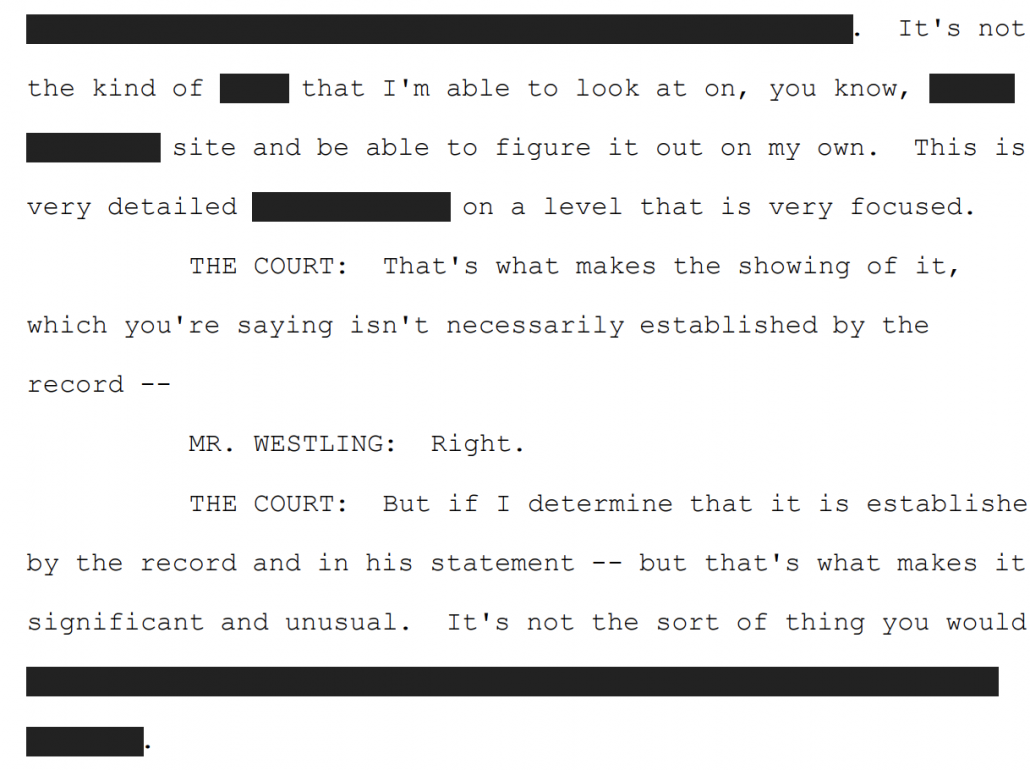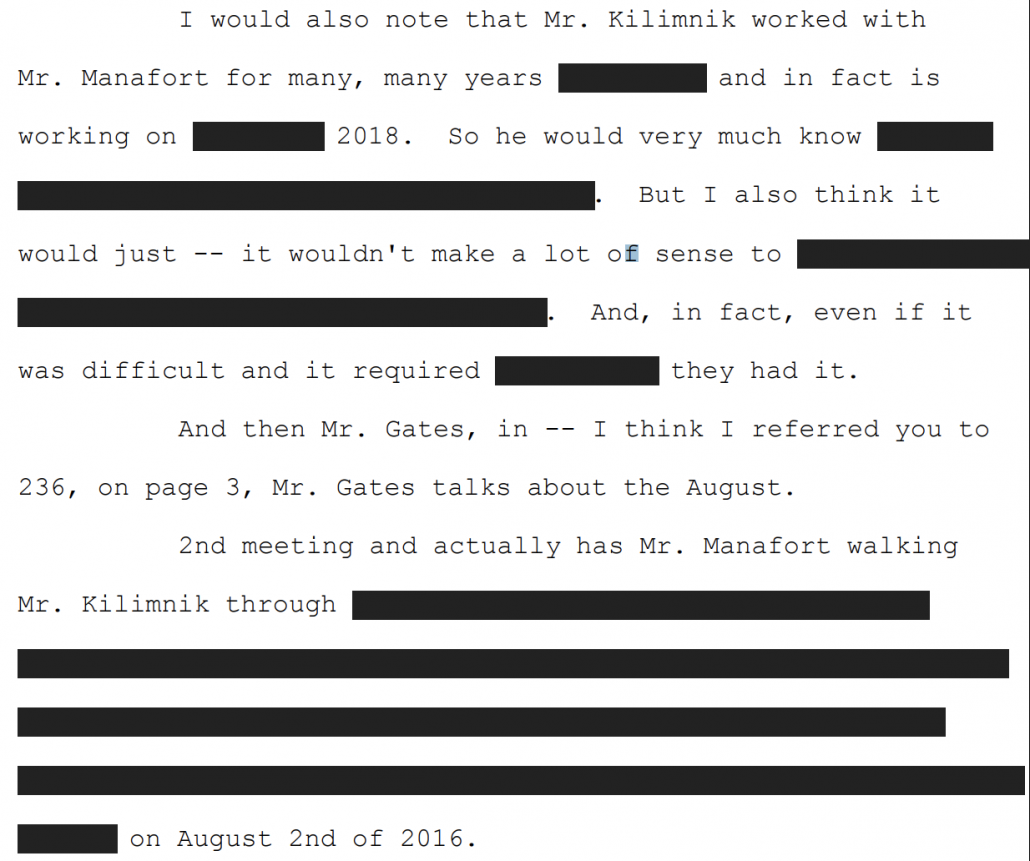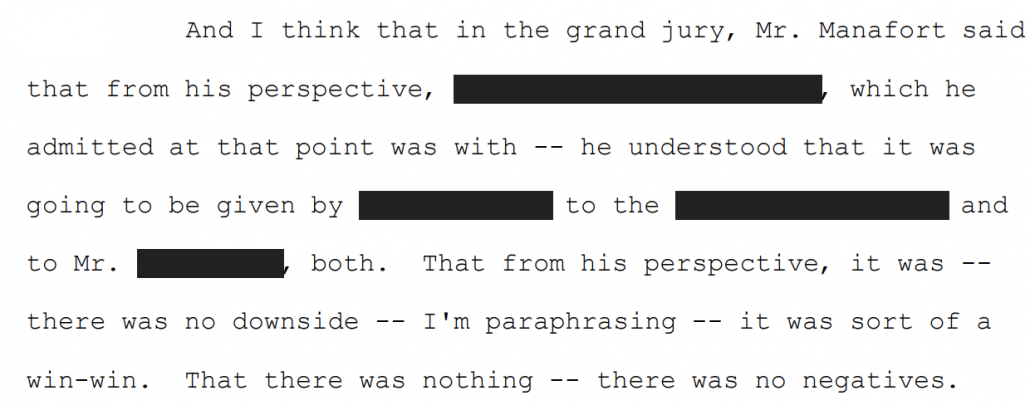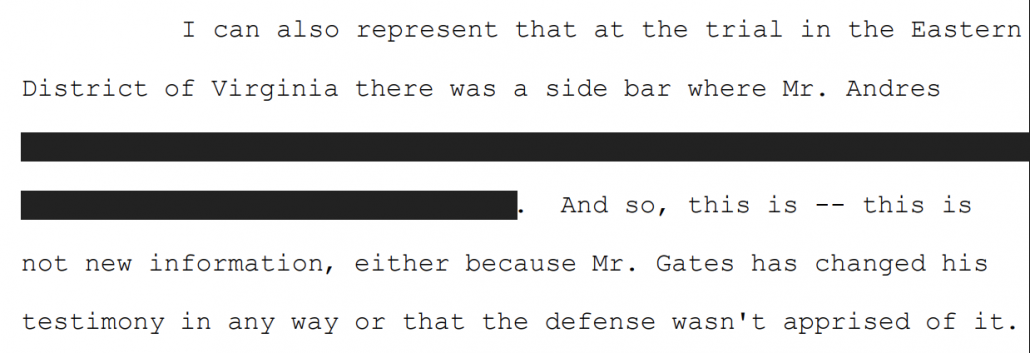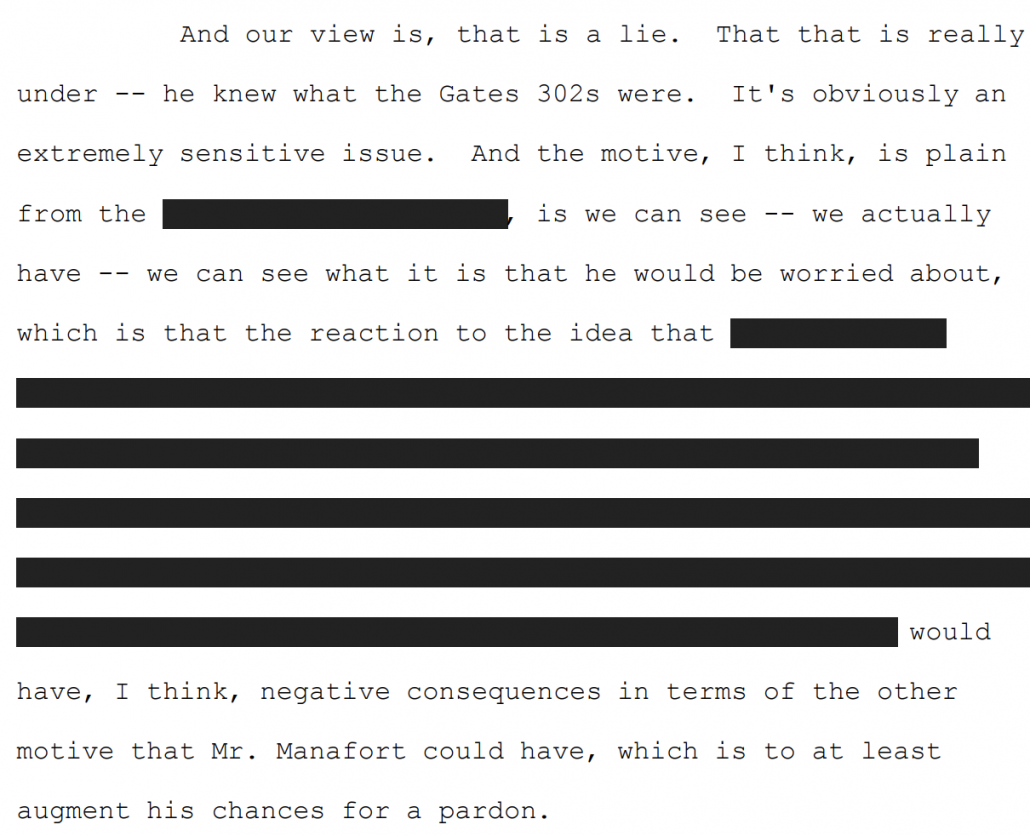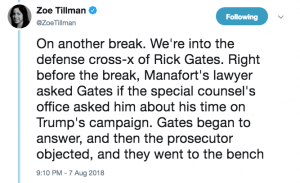Paul Manafort Sold Out Donald Trump — and His Anonymous Leakers Are Lying about It Publicly
Back when Paul Manafort’s lawyers redaction fail first revealed that Manafort lied about sharing polling data with Konstantin Kilimnik, someone made the following claim to the NYT:
Both Mr. Manafort and Rick Gates, the deputy campaign manager, transferred the data to Mr. Kilimnik in the spring of 2016 as Mr. Trump clinched the Republican presidential nomination, according to a person knowledgeable about the situation. Most of the data was public, but some of it was developed by a private polling firm working for the campaign, according to the person.
Given what appears in the breach hearing transcript, that appears to be a totally blatant lie. And Manafort’s lawyers appear to have made similar cynical lies in that hearing to deny what Manafort had actually done.
For reference, here are the other filings on Manafort’s breach:
- December 7: Initial Government breach filing
- January 8: Manafort redaction fail
- January 15: Government’s longer breach filing with exhibits
- January 23: Manafort response
The data was incredibly detailed
The discussion of the polling data starts on page 82. Judge Amy Berman Jackson starts by noting that Manafort tried to deny the data had been shared and claimed at one point that it was just public data.
He said it just was public information.
Later in the hearing, when Manafort’s lawyers suggest that this was mostly public data — part of the claim that someone leaked to the NYT — ABJ asked then why the pollster (this is probably a reference to Tony Fabrizio, whom Mueller met with in the weeks before Rick Gates flipped and after Gates first revealed that they had shared the data) was making so much money.
In response, Richard Westling, from the same defense team working so hard to claim this was public data, then wildly shifted, arguing that the data was so detailed it would be meaningless to someone like him. In response, ABJ notes that that’s what makes the sharing of it so important.
But, as Weissmann lays out, not only had Kilimnik worked for Manafort (and therefore with this pollster, Fabrizio) for many years — so would know how to read the data — Manafort walked him through the data at the August 2 meeting.
Later in this exchange, ABJ has an ex parte discussion with the prosecutors, to see if something she’s been made aware of can be shared with Manafort’s lawyers. Remember: she is also presiding over Sam Patten’s case. Patten worked with both Gates and Manafort, and was working with Kilimnik in this period. He not only might be able to corroborate the data-sharing story, but he would be able to help Kilimnik use it, even if the years of working with Manafort hadn’t already prepared Kilimnik to do so himself. When Patten submitted a status report on December 31, it was filed under seal; his next status report is due on Monday.
The data was shared with multiple people, which Manafort considered a win-win
Andrew Weissmann lays out that Manafort ultimately admitted that the data would be shared both with a named individual and with some other entity. And he describes Manafort considering the sharing of that data to be a win-win, perhaps suggesting that it might help Donald Trump, but even if it didn’t, it would get him work in Ukraine and Russia down the road.
Weissmann returns to that — sharing this data, for Manafort, was a win-win, unless the fact that he shared the data subsequently became public.
Mr. Manafort had said there was no downside to Mr. Manafort doing it.
[snip]
MR. WEISSMANN: And meaning all of this is a benefit. The negative, as I said, was it coming out that he did this.
Of course, now it’s public and Manafort is willing to lie himself into further prison time to try to downplay that he shared detailed polling data with someone the FBI maintains has ties to the same Russian agency that hacked the DNC right in the middle of the campaign.
Update: JL notes that neither of the two Ukrainian oligarchs identified by NYT’s leakers, Lyovochkin and Akhmetov, fit the 9-character redaction after “Mr.” in the last screen cap. But “Deripaska” does. And we know this meeting was specifically focused on Kilimnik reporting back to Deripaska. In addition, Deripaska’s plane was in NY just after the meeting.
Manafort and Gates shared the data on August 2, not in the spring
At least according to ABJ’s understanding, Gates and Manafort shared the data not in the spring (as claimed to the NYT) but at the August 2, 2016 meeting at the Havana Club, to which — discussion elsewhere made clear — the two men came and left separately, emphasizing the clandestine nature of this hand-off.
ABJ’s understanding is backed by several Gates’ 302s, which must also correlate with emails that, per ABJ, corroborate Gates’ account.
Even before ABJ made that point, Westling appears to suggest that what Gates shared with Kilimnik was the most recent data.
One other reason this is important — but which didn’t get mentioned in this hearing: Manafort shared incredibly detailed polling information with someone who has ties to GRU a month before GRU went back to hack Hillary’s analytics. So they had very detailed data from both sides.
Kevin Downing twice attempts to render a jury verdict against Gates
Manafort’s team, generally, tries to claim that the sharing of polling data is just a matter of Gates’ word against Manafort’s, in spite of there being emails involving Manafort himself on sharing the data (and, apparently, emails showing whom Kilimnik shared them with).
But when ABJ notes that the poll data hand-off happened at the August 2 Havana Club meeting, in a fit of desperation, Kevin Downing claims that this all depended on Gates’ testimony and ABJ shouldn’t take anything he said as true because the jury found he totally lacked credibility. ABJ warns him twice not to go there.
MR. DOWNING: Your Honor, one other point. I know this Court hasn’t had the opportunity to review the testimony, probably, of Mr. Gates from Eastern District of Virginia, but he was found so incredible by the jury that a juror said to the press that they completely disregarded his entire testimony. So to the extent that this Court would cite Mr. Gates as any evidence, I think a review of the findings of the jurors in EDVA should be undertaken because if he is not corroborated —
THE COURT: Don’t. Don’t.
MR. DOWNING: Your Honor, it’s a fact.
THE COURT: I’m not going to base anything on what one juror said to the press.
In spite of having been warned once, Downing again returns to what the juror in EDVA said later in the hearing.
MR. DOWNING: And I will admit, on my end I won’t take it as a failure on my part because I did not think this Court wouldn’t take into consideration the fact how he was found to have no credibility at all by the jury over there.
THE COURT: You cannot keep saying that.
MR. DOWNING: I can keep saying it, Your Honor, because it’s true
THE COURT: First of all, you’re asking me to make a determination about what 12 jurors concluded because of what one juror was quoted in the paper as saying, which right now I don’t even have in front of me. But I believe she said we decided to vote on whether or not we could find him beyond a reasonable doubt, putting his testimony aside, which is different than saying we agreed, as 12 people, that nothing he said was true.
MR. DOWNING: That’s — that’s —
THE COURT: That’s totally different.
MR. DOWNING: I disagree with you. But I could go and get the press account of that.
THE COURT: I don’t know. I don’t have the press account. The press account is not evidence.
Downing floats bringing ABJ the press account himself, but then suggests he could provide the transcript. ABJ even offers to call Gates before her to testify.
Over lunch, ABJ goes on her own to find that press account. And, as she explains immediately after lunch, she doesn’t agree with Downing’s reading of it. Indeed, she calls it hyperbolic.
I went back and read the article that I believe I read at the time and, indeed, there was a juror who spoke publicly. She spoke publicly because she said she wanted the public to know that while she wanted Mr. Manafort to be not guilty, the evidence was overwhelming.
She indicated that the only reason he was not convicted on all counts was because of a lone holdout in the jury. She did not attribute that to Mr. Gates’s credibility. And reportedly, she did say, as I thought I recalled, some of us had a problem accepting his testimony because he took the plea. So we agreed to throw out his testimony and look at the paperwork. And then she added, I think he would have done anything to preserve himself, that’s just obvious in the fact that he flipped on Manafort.
So, I don’t believe — there’s certainly not anything in this record for these proceedings, or the public record, for that matter, that supports your argument that I should consider the fact that the jury unanimously concluded he was a liar, as was reported in the press by a juror, and threw out his testimony. I don’t believe that that is what the newspaper articles reported. Not that I would have relied on the newspaper article or what happened in the Eastern District of Virginia anyway, but I believe your argument was a little hyperbolic.
Manafort’s lawyers knew about this allegation because they tried to air it during the EDVA trial
In addition to trying to claim that this matter just pits Gates against Manafort, Manafort’s lawyers try to claim that Gates only made the claim about sharing polling data last fall, late in the process of his cooperation, meaning that they didn’t have an opportunity to prep their client on it.
I may be wrong about this, but we have a note — a September 27th, 2018 interview which we did not see until this submission was made, where Mr. Gates makes that statement.
Mr. Weissmann has suggested we had all of Mr. Gates’s 302s where he said this previously. I don’t think he said it before that interview. And so as far as we know, that’s new testimony from Mr. Gates compared to what he said in prior proffer sessions, where I think he said something more like it was more what was publicly available.
Weissmann corrects that by noting that at a proffer on January 30, 2018, Gates laid all that out.
Mr. Weissmann, with respect to the specific argument that they just made that this was a new twist by Mr. Gates, only in the 302 that they most recently received, do you have anything you want to add to that, respond to that?
MR. WEISSMANN: Yes, I do. So, I would direct the Court’s attention to Exhibit 236, which is a 302 with respect to Mr. Gates, and the date of that is January 30th, 2018.
He later notes the two 302s from early in Gates’ cooperation where that came up (it was actually January 31, not January 30).
In any case, after first raising Gates’ proffer from January mentioning Manafort sharing this polling data, Weissmann notes that Kevin Downing called attention to this during the EDVA trial.
Back in September, I suggested that Greg Andres’ success at getting this sidebar sealed probably had something to do with Manafort’s willingness to take a fairly shitty plea deal. It was a big fucking deal at the time. And the notion that Kevin Downing — who tried to get the information in the public record at the trial — is now claiming he didn’t know about it is simply contemptuous.
Manafort lied about sharing data with a Russian asset in hopes of getting a pardon
And this is where what appears to be at least the second reference in the hearing to Manafort’s hopes of getting a pardon appears (by context, this is almost certainly Weissmann, though the transcript labels it as Westling).
Manafort knows well what he did in August 2016. But he — and his lawyers, and whoever lied anonymously to the NYT — continue to lie about it in hopes that, by refusing to confirm that he conspired with Russia to get Trump elected, Trump will pay him off with a pardon.
The truth appears to be that Manafort walked Konstantin Kilimnik through recent, highly detailed polling data at a clandestine meeting in NYC on August 2, 2016, in part because even if it didn’t help Trump, it might help his own fortunes down the way. And he’s willing to bet that lying about that fact is his best chance for a pardon.
Update, from the comments: Eureka notes that the same night Manafort shared campaign data, probably with Oleg Deripaska, Stone defended him, insisting he was doing “everything humanly possible to help” Trump.
Aug 2, 2016 09:59:24 PM The idea that @PaulManafort is not doing everything humanly possible to help @realDonaldTrump win is patently false [Twitter for iPhone]
As I disclosed last July, I provided information to the FBI on issues related to the Mueller investigation, so I’m going to include disclosure statements on Mueller investigation posts from here on out. I will include the disclosure whether or not the stuff I shared with the FBI pertains to the subject of the post.



